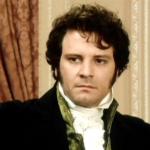Today that word is reverie. It started when I looked up to see if I could use the word filtered in Regency times. No, not really. Jane Austen doesn't use it - too scientific at that time I guess. I decided that penetrated was the nearest Regency equivalent to filtered for the context in which I wanted to use it.
But I digress. Casually reading a bit of Austen and there it was - reverie. Chapter 6, Pride and Prejudice.
 Miss Bingley says to Darcy: “I can guess the subject of your reverie.”
Miss Bingley says to Darcy: “I can guess the subject of your reverie.”His reply: “I should imagine not.”
“You are considering how insupportable it would be to pass many evenings in this manner–in such society; and indeed I am quite of your opinion. I was never more annoyed! The insipidity, and yet the noise–the nothingness, and yet the self-importance of all those people! What would I give to hear your strictures on them!”

“Your conjecture is totally wrong, I assure you. My mind was more agreeably engaged. I have been meditating on the very great pleasure which a pair of fine eyes in the face of a pretty woman can bestow.”
The insipidity... the noise... the nothingness... great words, great assonance (the repetition of vowel sounds) but to top them all - reverie.
What a super word. It comes from the French and has been used since the 14th century according to my etymology dictionary to mean wild conduct or a frolic. Its use as Austen uses it, to mean a daydream, dates from the 17th century.
Now I just need a reason to use it in my work-in-progress, but I think my current hero's musing is too problematic to be Austen-esque reverie.
Unlike Mr Darcy, whose reverie is caused by...?
a) What he ate for breakfast
b) His ten thousand a year
c) Miss Elizabeth Bennet
Kate Allan
My Website

It would have to be Elizabeth!
ReplyDeleteCorrect! lol
ReplyDelete